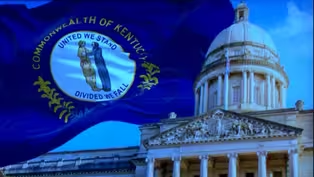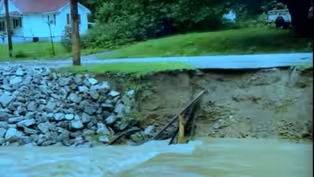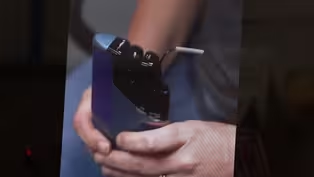
School District Encouraging Reading In a New Way
Clip: Season 3 Episode 222 | 4m 48sVideo has Closed Captions
A new literacy project gives kids the opportunity to hear a story read to them over the phone.
The Middlesboro Independent School District is encouraging reading in a different way. A new literacy project, Jacket Storytime Phonebook, gives children the opportunity to hear a story read to them over the phone with high school and middle school students lending their voice.
Problems playing video? | Closed Captioning Feedback
Problems playing video? | Closed Captioning Feedback
Kentucky Edition is a local public television program presented by KET

School District Encouraging Reading In a New Way
Clip: Season 3 Episode 222 | 4m 48sVideo has Closed Captions
The Middlesboro Independent School District is encouraging reading in a different way. A new literacy project, Jacket Storytime Phonebook, gives children the opportunity to hear a story read to them over the phone with high school and middle school students lending their voice.
Problems playing video? | Closed Captioning Feedback
How to Watch Kentucky Edition
Kentucky Edition is available to stream on pbs.org and the free PBS App, available on iPhone, Apple TV, Android TV, Android smartphones, Amazon Fire TV, Amazon Fire Tablet, Roku, Samsung Smart TV, and Vizio.
Providing Support for PBS.org
Learn Moreabout PBS online sponsorshipThe Middlesboro Independent School District is encouraging reading in a different way.
A new literacy project Jackett Story Time phone book gives children the opportunity to hear a story read to them over the phone, with high school and middle school students lending their voice talents.
One of my team members recalled years ago and when she was a little girl, the local bank here, had a program where they would allow, callers to call in to the bank and they would hear a story from, from from the bank employees there.
And I thought that was a great idea.
Story time.
Phone book is a phone line that we have where students and families, members of the community can call and hear a story, read.
Stories are being read by our students.
So mainly high school, but I do record middle school students as well.
Welcome to the phone book.
So I've read a couple, you know, a couple of books, a couple of, you know, more like bedtime stories.
But my favorite would probably be if you ever want to bring a crocodile to school down.
It was really funny.
Had a lot of, rhetorical devices.
You know what?
I want to pay you those things that I'm excited about.
I'm an English nerd, so that's how I pick mine.
You know, what do I think is the most interesting?
Probably from a literary standpoint.
Oh, takes days upon days of training.
My voices would never fit that slop to my pad.
And also, it makes me feel really honored that people love hearing my voices and may reading my book.
And it just makes me feel warm inside.
Like people actually love my reading.
It's always two people per book for the most part.
To animate the different characters and go back and forth to create that dialog.
Like it's like an actual story.
And they'll, they'll sit there and practice will go through 2 or 3 practice runs.
Then the red light comes on in the record and it just makes a great story.
Knock, knock.
Who's there?
Joe invited.
Joe invited who?
Joe invited you to come to the party.
I like it, it's kind of stressful sometimes if you mess up for some, but it's pretty fun overall.
I'm a parent who values reading to your child.
I think it's important, but I'm also very busy, like I coach and I teach, and so there are lots of times when I'm not able to sit down and read a book to my kid every night, but knowing that's an option every week to call in and have that, something in, you know, especially for kids that maybe don't have a parent that can read to them every night, that gives them an option to, experience that as well.
One of the support structures that we have in place is through a program called Innovative Approaches to Literacy.
And so what we know is that, rural kids typically are they're the environments in which they, they live in and grow up in are not print rich.
Okay.
And so we want kids, we have certain metrics that we follow.
One of them is kindergarten readiness.
Okay.
Is a child ready to be successful in school when they come to kindergarten?
Well, that means you've got to intervene early and support early.
So this particular program is all about building a rich, rich, culture of literacy, not just in the schools, but specifically partnering with families to do that.
From research, we know that the importance of oral language as a bridge to reading and writing skills.
And so students who are read to students who listen to oral stories at home that helps them develop their own world language abilities, it's all about the inflection that you put into the book.
You know, you pause where there's a comma, you pause or something happens.
You you crescendo with your voice and your day crescendo, and you do all of those ebb and flow things.
When you're reading.
But I think in some ways it's better because it really increases a child's ability to to learn auditory.
Auditory.
You know, I, I'm not an auditory learner, but you learn in high school, you really have to be able to receive and and, you know, get that information verbally.
So I think that it helps children to be able to do that.
You know, they're not focusing just on the pictures to tell them what the story saying, but they're listening to the words to tell them what the story is.
For the older kids, who are the readers, you know, they're also improving their reading.
They're improving their literacy skills by practicing the kids that are a part of the program.
They love it.
I mean, they absolutely love it.
It's a lot of fun for them to to sit down with some of their friends here at school and they get to kind of step out of their normal high school aged typical life, and they get to kind of read a children's story and they get to animate their voice and they get to kind of step away from where they feel like they have to be, to where they can now really connect more with those younger age kids.
Goodbye, everybody.
See you on the next episode.
My I am nice SpongeBob.
The first month of the program, there were nearly 400 callers.
Now the program receives about $100 a month.
Beshear Line-Item Vetoes Funding For Private School SROs
Video has Closed Captions
Clip: S3 Ep222 | 1m | Beshear said Kentucuky's Constitution requires public funds be used for public schools. (1m)
Franklin Co. Child Swept Away In Floodwaters Drowns
Video has Closed Captions
Clip: S3 Ep222 | 3m 38s | Police said the boy was on his way to his bus stop when he was swept away. (3m 38s)
Metals Industry, Data Centers Booming In Kentucky
Video has Closed Captions
Clip: S3 Ep222 | 7m 52s | Mark Green with The Lane Report says Kentucky has a major foothold on steel and aluminum. (7m 52s)
New Tool Helping Inmates Fight Addiction
Video has Closed Captions
Clip: S3 Ep222 | 4m 21s | The NET Device helps ease withdrawal symptoms and is now being used in a KY jail. (4m 21s)
Providing Support for PBS.org
Learn Moreabout PBS online sponsorship
- News and Public Affairs

Top journalists deliver compelling original analysis of the hour's headlines.

- News and Public Affairs

FRONTLINE is investigative journalism that questions, explains and changes our world.












Support for PBS provided by:
Kentucky Edition is a local public television program presented by KET



